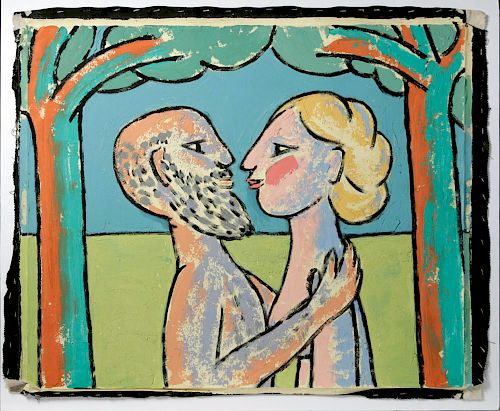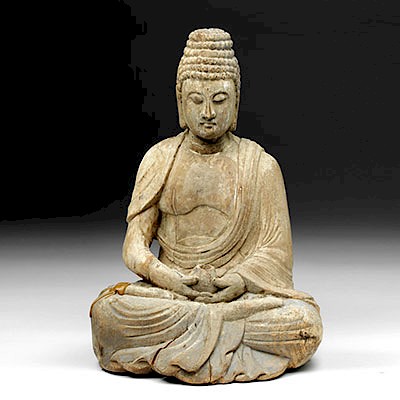Signed Jack Hooper Painting - Amorous Couple
Lot 156
About Seller
Artemis Gallery
686 S Taylor Ave, Ste 106
Louisville, CO 80027
United States
Selling antiquities, ancient and ethnographic art online since 1993, Artemis Gallery specializes in Classical Antiquities (Egyptian, Greek, Roman, Near Eastern), Asian, Pre-Columbian, African / Tribal / Oceanographic art. Our extensive inventory includes pottery, stone, metal, wood, glass and textil...Read more
Categories
Estimate:
$3,000 - $6,000
Absentee vs Live bid
Two ways to bid:
- Leave a max absentee bid and the platform will bid on your behalf up to your maximum bid during the live auction.
- Bid live during the auction and your bids will be submitted real-time to the auctioneer.
Bid Increments
| Price | Bid Increment |
|---|---|
| $0 | $25 |
| $300 | $50 |
| $1,000 | $100 |
| $2,000 | $250 |
| $5,000 | $500 |
| $10,000 | $1,000 |
| $20,000 | $2,500 |
| $50,000 | $5,000 |
| $100,000 | $10,000 |
| $200,000 | $20,000 |
About Auction
By Artemis Gallery
Jun 7, 2018
Set Reminder
2018-06-07 09:00:00
2018-06-07 09:00:00
America/New_York
Bidsquare
Bidsquare : Clearance Sale - Ancient / Ethnographic Art
https://www.bidsquare.com/auctions/artemis-gallery/clearance-sale---ancient-ethnographic-art-3264
Looking for a bargain on authentic ancient and ethnographic art? These lots are going, going, gone! Artemis Gallery info@artemisgallery.com
Looking for a bargain on authentic ancient and ethnographic art? These lots are going, going, gone! Artemis Gallery info@artemisgallery.com
- Lot Description
United States, Jack Hooper (American / Mexican, 1928-2014), untitled acrylic on canvas, ca. 1950s to 1960s CE. A striking Jack Hooper painting depicting an amorous couple embracing beneath a canopy of trees, the trunks flanking their torsos to make for a balanced composition delineated in a vibrant color palette of aqua blue, spring green, coral, sky blue, lime green, periwinkle, blush pinks, and sunny yellows - boldly contoured in black. Hooper was among a group of talented Bay Area California artists who developed a West Coast aesthetic that challenged the non-objective style of Abstract Expressionism by reintroducing the figure - at once employing "gestural spontaneity and emotional vibrancy expressed through brush strokes, brilliant color and the incorporation of chance elements" as well as figural representation. Size: painted image 30" L x 37" W (76.2 cm x 94 cm); entire canvas measures 32" L x 39" W (81.3 cm x 99.1 cm)
During his lifetime, Hooper's works were exhibited in art museums and galleries, both nationally and internationally, in traveling invitational shows at the Whitney Museum of American Art in New York City, the San Francisco Museum of Modern Art, the Los Angeles County Museum, the Amon Carter Museum of Art, the Oakland Art Museum, and the Long Beach Museum of Art. His work appeared alongside the likes of Richard Diebenkorn, Clyfford Still, and Mark Rothko and was also featured in solo exhibitions in Europe, Mexico, and the United States. Hooper spent his final years living in rural Mexico where he had studied earlier in his career and was also a mural assistant to David Alfaro Siqueiros (Mexican, 1896-1974), one of Los Tres Grandes (the big three painters, along with Diego Rivera and Jose Clemente Orozco) of the Modern Mexican Muralist movement. While living at the foot of a volcano at the edge of a lake, Hooper continued to paint and draw until his death on January 24, 2014.
The following passages were excerpted from a biographical statement written by Peter G. Arnovick, who collected his works from 1958 until his passing in 2015, and Vanessa Hooper, one of the artist's daughters: "Born in 1928, Jack Hooper grew up in Los Angeles, CA. After graduating from high school, Jack joined the Army Air Corps just at the end of WW II. After his military service, he graduated from Los Angeles City College. But as an eager young artist, he sought a first-rate art education, and he was therefore ultimately drawn to the vibrant art scene of Mexico. These were his years of intense artistic and political dynamism, dominated by the three brilliant painters and muralists: Diego Rivera, Jose Clement Orozco and David Alfaro Siqueiros.
In Mexico City, Hooper enrolled at the College of the Americas and became a mural assistant to Siqueiros. He remained there for two years, studying and absorbing the art scene. He recalled, “I became close to Siqueiros, the leader of the Communist Party of Mexico and was subject to frequent arrests by the authorities. Hooper knew many of the artists of the period, including Frida Kahlo who would become the subject of many of his portraits and studies over the coming decades.
During this same period, California artists were beginning to challenge the hegemony of Abstract Expressionism in American art and reintroduce the figure in their presentation. This was a risky move in that the ideology surrounding abstract art in general, and Abstract Expressionism in particular, consigned figure painting to conservative or even reactionary trends or mere illustration. Yet many of the artists associated with this new movement had been prominent abstract painters themselves; they highly valued the gains and artistic achievements of Abstract Expressionism.
In Europe from 1952 - 1955, Hooper attended the Academie Julian, an important art school in Paris viewed as an “alternative” to the official Ecole des Beaux Arts. Henri Matisse was one of many great artists associated with the school and Hooper considers Matisse to have been an important influence in his development. Another alumnus of the Academie was the cubist sculptor, Jacques Lipchitz. Hooper’s heads often have a sculptural quality that is reminiscent of Lipchitz work. Both Hooper and Lipchitz deconstruct the form but never dissolve the image into abstraction.
Then from 1956-58 he was an Associate in Art at UCLA and was a studio assistant to the painter Rico Lebrun. This was a period of intense creativity and recognition. He had many shows in a variety of museums and galleries and continued to receive awards."
Hooper's biography continues with many additional highlights, including professorships at University of Colorado in Boulder, UCLA, and Mount Saint Mary's College in Los Angeles; invitations to exhibitions such as Fifty California Artists at the Whitney Museum of American Art in New York and at the San Francisco Museum of Modern Art; and the completion of fourteen murals in Los Angeles.
Provenance: private collection of the late Peter Arnovick, San Francisco, CA
All items legal to buy/sell under U.S. Statute covering cultural patrimony Code 2600, CHAPTER 14, and are guaranteed to be as described or your money back.
A Certificate of Authenticity will accompany all winning bids.
We ship worldwide and handle all shipping in-house for your convenience.
#121893Overall excellent. Some minor folds to edges of the canvas.Condition
- Shipping Info
-
All shipping is handled in-house for your convenience. Your invoice from Artemis Gallery will include shipping calculation instructions. If in doubt, please inquire BEFORE bidding for estimated shipping costs for individual items.
-
- Buyer's Premium



 EUR
EUR CAD
CAD AUD
AUD GBP
GBP MXN
MXN HKD
HKD CNY
CNY MYR
MYR SEK
SEK SGD
SGD CHF
CHF THB
THB

















